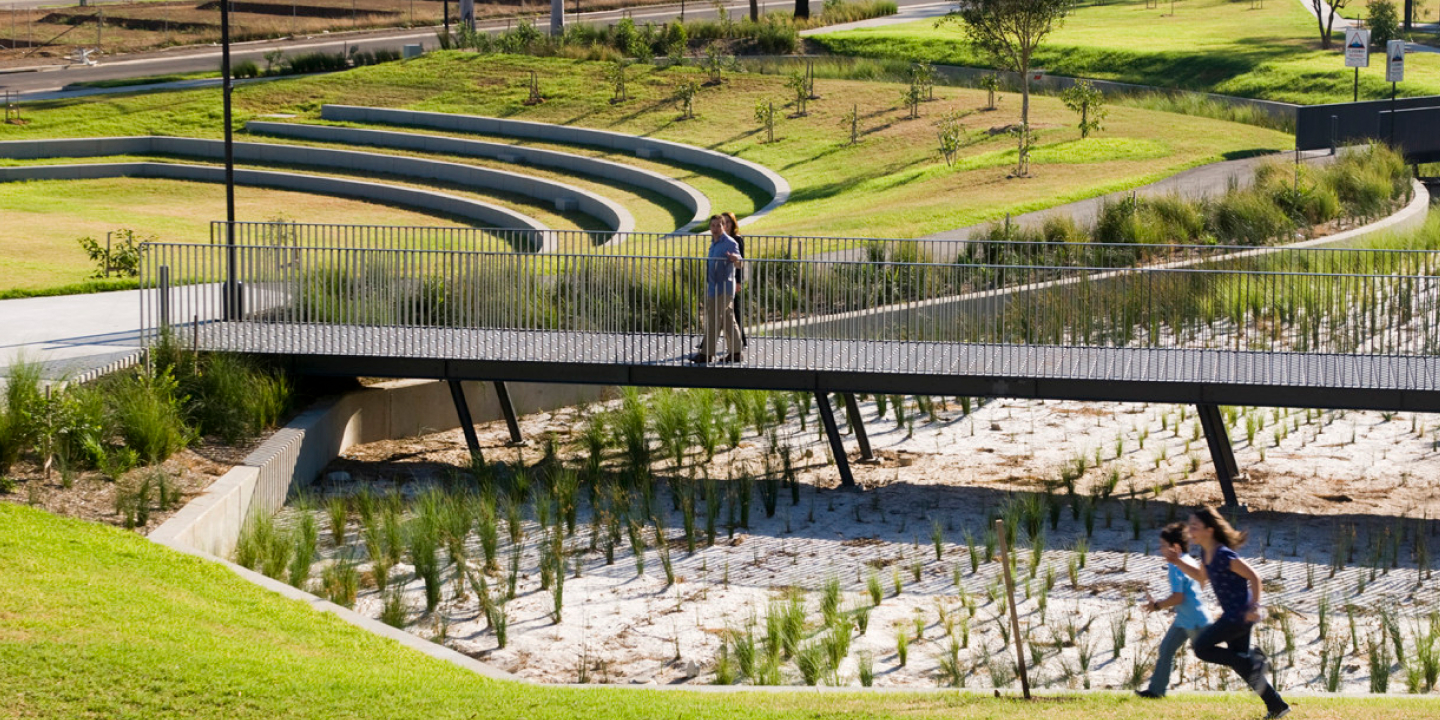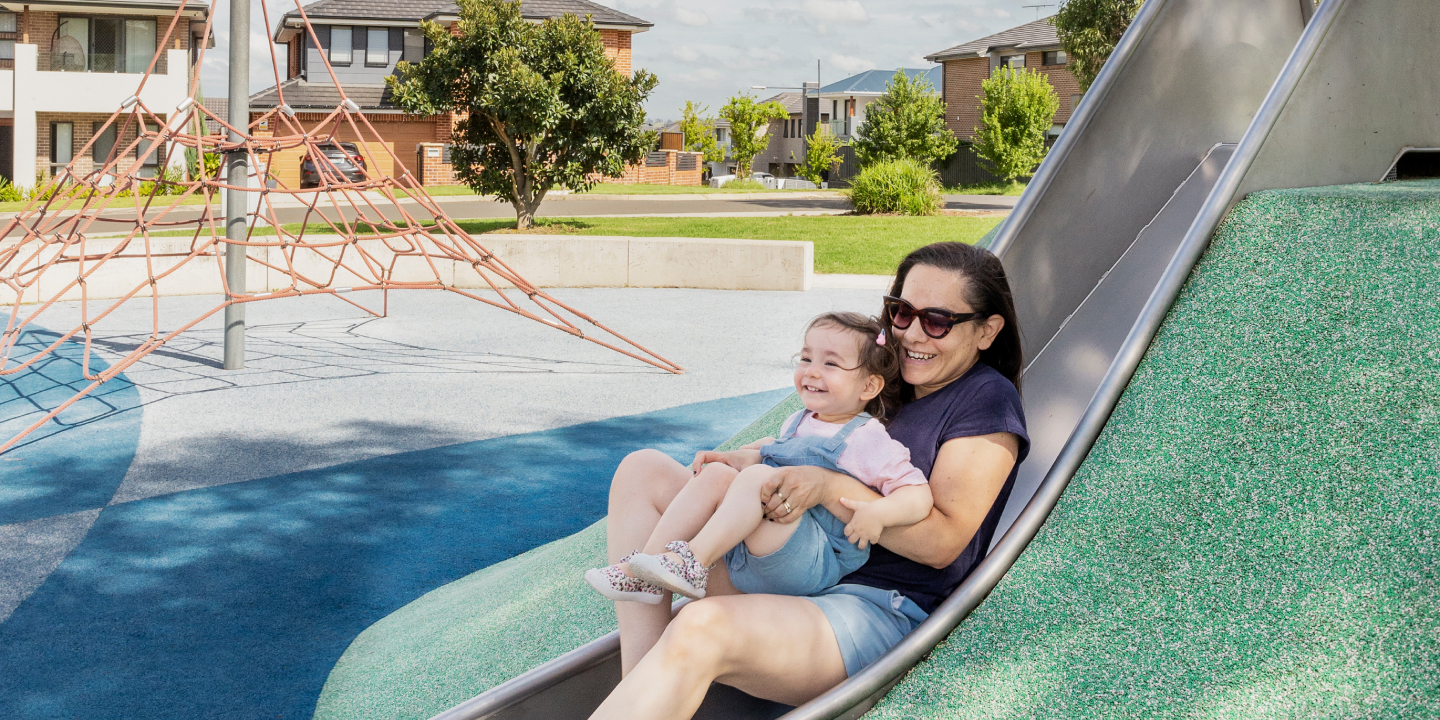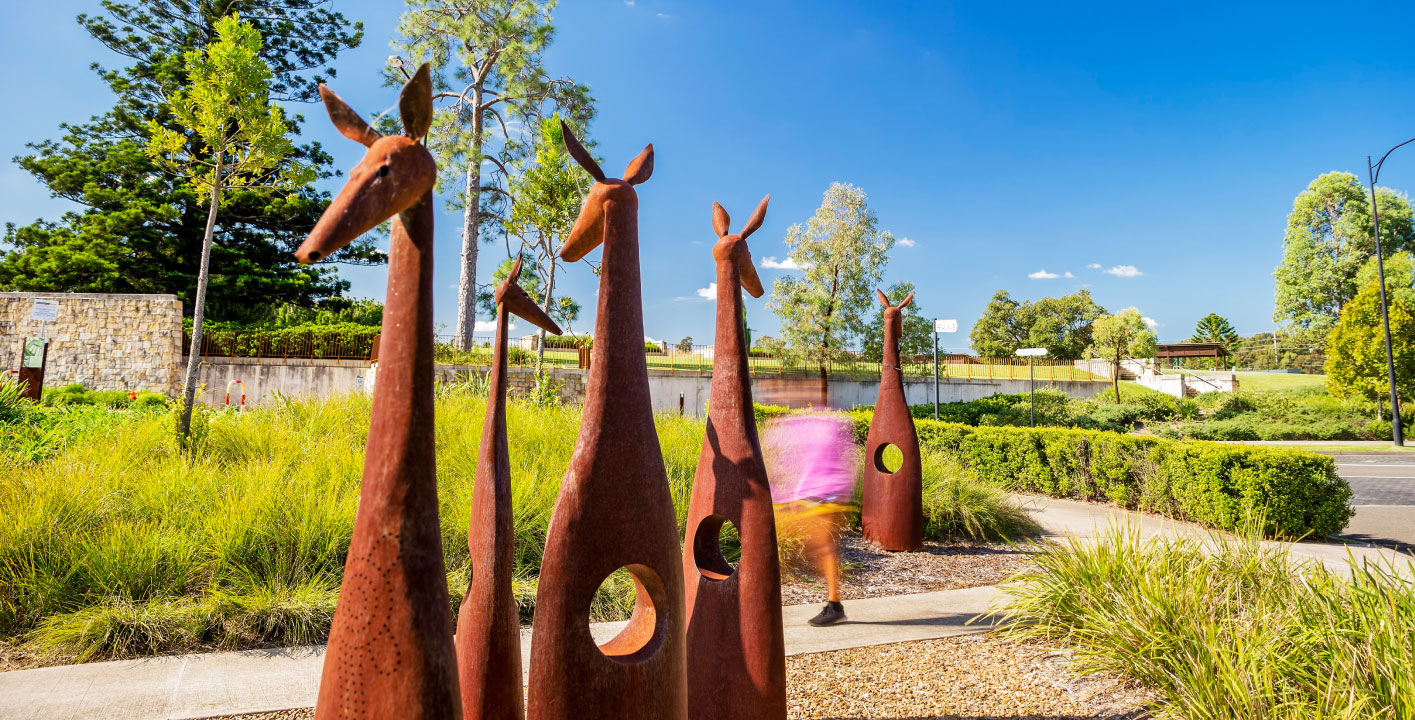Leadership Goal
Objective
Drive the delivery of productive places, and enable jobs for the future.
Target
To contribute to a global innovation economy by enabling 30,000 enduring jobs for the future by 2036.
Relevant SDGs
Overview
Landcom’s Productive Places pillar is focused on a leadership goal to ‘contribute to the global innovation economy by enabling over 30,000 new jobs by 2036’. This is our economic pillar committed to delivering places that will be productive and engaging for those that live there.
This leadership goal was developed to reflect Landcom’s commitment to economic development, strengthening technology infrastructure and advancing equitable opportunities for skills development and education.
Landcom addresses the enablement of jobs and innovation through the following focus areas:
- Training & Employment
- Innovation
Each of these focus areas includes a suite of targets to measure our success.
Case Study
Collaborative Urban Teaching PlatformNew Case Study
The Collaborative Urban Teaching Platform (CUTP) is a multi-university, cross-disciplinary urban teaching partnership developed by Landcom and several NSW-based universities. It aims to foster engagement between research institutions, government, and students.
READ MORECase Study
Fostering Resilience through Collaboration
Landcom has also engaged with the industry and local government around two new research initiatives supporting community resilience. Landcom partnered with Campbelltown City Council and were awarded a Local Government NSW (LGNSW) Research and Innovation Grant in December 2020. Our successful joint pitch is for the project ‘Creating a Spark – Energy Sharing Communities’.
READ MOREManagement Approach
Our leadership goal to enable 30,000 jobs across our communities by 2036 is in direct response to the broader NSW government objectives. As at 2036, the Greater Sydney Commission (GSC) forecasts the Sydney region alone will need 817,000 new jobs. As part of Landcom’s mandate we support these targets by developing great places and mixed-use communities where people can work, live and play.
In FY18 our Economic Development Working Group23 released an approach for overcoming the challenge of consistently and effectively calculating our efforts to enable enduring local jobs. We use proxy employment ratios, developed through detailed research and benchmarking, attributed to various land uses based on m2 gross floor area. Examples of land uses included are commercial, retail, industrial, community, cultural, tourism, health services, education, storage, hotel, serviced apartment, student housing and residential. As jobs creation is a long term goal for Landcom, we report our performance based on the FY actuals, and forecast jobs created for the life of a project. This gives us a clear indication of whether we are on track to meet our 2036 target.
In FY19 Landcom’s methodology was also adopted across the NSW Government’s Common Planning Assumptions Group (CPAG), influencing a consistent government wide approach.
We also contribute to advancing education and skills development across our communities. We work with industry and registered training organisations to develop programs that address specific skills requirements of locals and provide training opportunities and employment pathways for those experiencing low or long term unemployment. We also collaborate with schools and other educational institutions to deliver learning and youth engagement programs that are aligned with the NSW primary and secondary curriculum topics.
For Landcom’s FY21 performance for enabling jobs and providing local Training & Employment outcomes see Training & Employment Performance Results below.
_________________________
23 Participants include NSW Government Architect, Greater Sydney Commission
Landcom addresses innovation by investing in research that advances the property and development industry, and future-proofing our communities.
We invest in collaborative research such as Cooperative Research Centre programs, or via our own Roundtable. Landcom’s Roundtable is a collaboration with other government organisations24 and eight leading Australian universities. Comprised of senior representatives from each institution, the Roundtable meets several times a year to review research proposals that advance urban development innovation.
Governance: Landcom’s Roundtable

Landcom’s research priorities are aligned to our Strategic Directions:
|
|
||
|
Housing Increase the affordability, supply and diversity of housing |
Landcom is interested in research that:
|
||
|
Partnerships Partner with others to unlock development opportunities and improve delivery |
Landcom is interested in research that:
|
||
|
Leadership Demonstrate excellence in sustainable development and planning practices |
Landcom is interested in research that:
|
Landcom addresses emerging technologies in our Innovation focus area. Currently we are seeking to roll out smart technology to our new communities in the form of electric vehicle (EV) rapid charge stations and increasing the provision of free Wi-Fi in public places. We see these initiatives as future‑proofing communities, reducing inequalities in access to information and ensuring early adoption of future transport technologies.
Ultimately, the provision of EV chargers throughout Landcom communities improves resilience, reduces greenhouse gas emissions, and reduces transport related cost of living expenses for residents. These targets also contribute to Landcom’s low-carbon transport approach, including accessibility to public transport, walkable and cycling-friendly neighbourhoods (see Health, Equity & Inclusion).
_________________________
24 During FY21 government participants included NSW Government Architect, Greater Sydney Commission.
Our Sustainable Places Strategy identifies a number of initiatives as future opportunities to enhance our Productive Places commitments. These include:
- adopting a Reconciliation Action Plan (retired – integrated into BAU)
- continuing to engage with industry on smart cities and innovation.
In FY21 we commenced the process of adopting a Reconciliation Action Plan. We will update our management approach in FY22. This responds to our new material matter of respecting indigenous culture and heritage. We will also be moving this priority to our Accountable & Collaborative Place pillar, as it best aligns to Human Rights. Activities undertaken this year are shared in our Case Study: Developing a Reconciliation Action Plan.
Landcom is now an ongoing member of the Department of Planning, Industry and Environment Circular Economy Working Group, and focuses on innovation via our Roundtable and Green Star certifications.
Performance Results
See below our performance results for each of the reporting areas within our Productive Places Pillar.
Training & Employment
Targets
Performance
To contribute to a global innovation economy by enabling 30,000 enduring jobs for the future by 2036.
Performance

Targets
Projects to engage and foster education, learning or employment outcomes via actives or initiatives, based on identified needs of the local and regional community.
Performance
FY20:
Engaged over
800
students across our Skills Exchange, research and excursion programs
FY21:
Engaged over
12,200
students across our Skills Exchange, research and excursion programs
Performance Overviews
Landcom is on track to exceed our commitment to enable 30,000 enduring jobs by 2036. FY21 in scope projects include SMNW Places program, Macarthur Gardens North and Fennell Bay as well as new projects such as North Wilton, forecast to make a substantial contribution to Landcom meeting this goal. These forecasts will continue to be subject to change as future projects remain in the planning phase and we respond to market demand.
In FY21 we delivered our Skills Exchange program at Hillcroft in Claymore and Newbrook in Airds. The program is a partnership between Landcom, Land and Housing Corporation, and Empowering Growth. These communities and surrounding areas have an identified need for employment pathways for young people and the long term unemployed25.
In FY21 we had seven unemployed or disadvantaged students engaged in the Skills Exchange Program and they all successfully graduated in June 2021. The students came from within Claymore, Airds and surrounding areas. They participated in a three day training course over a six week period to gain a Certificate II in Construction pathways, and also focused on life-skills training such as financial management, job readiness, attaining their driver’s license and mental health wellbeing. A series of mentors also presented to the participants throughout the course.
Following graduation the participants will attend a series of job interviews, and will automatically enter a job finding club if unsuccessful in gaining immediate employment.
We also engaged over 12,000 primary, secondary and tertiary students throughout the reporting period, as part of our Roundtable research programs, school programs, events and engagements (see below Case Study: Collaborative Urban Teaching Platform).
_________________________
25 Airds: 26% unemployment rate:; Claymore: 27% unemployment rate
Innovation
Targets
Performance
Measure and report annual investment in research and development.
Performance
FY20:
$150,000
cash
$373,499
in-kind
FY21:
$10,899
cash
$407,005
in-kind
Targets
All project teams engaged in Landcom’s Roundtable ‘Communities of Practice’ program.
Performance
FY20:
FY21:
7
project teams engaged in Communities of Practice
Targets
Greenfield/Regional: all new communities provide electric vehicle chargers to service a minimum 10% total dwellings (as either publicly accessible or private use).
Urban Renewal/High Density: provide a minimum 10% parking yield, per parking lot, as EV Charge Station ‘turn-key’ ready at development completion.
Performance
FY20:
100%
in scope projects achieved
FY21:
100%
in scope projects achieved
Targets
Key open spaces to provide free Wi-Fi access.
Performance
FY20:
100%
in scope projects achieved
FY21:
100%
in scope projects achieved
*Our first Community of Practice meetings under the renewed Landcom Roundtable Agreement were due to be held in April 2020 however the impacts of COVID-19 on the university sector meant that we delayed the first meetings until July 2020 which fell outside of the reporting boundary.
Performance Overviews
In FY21 Landcom contributed $417,904 total investment value into collaborative research led by participants of the Roundtable. This includes $407,005 worth of estimated in-kind value contribution from Landcom employees based on research investment made at or before 30 June 2021. Many projects undertaken by the Roundtable include long term research outcomes, and as such may be included across multiple reporting years. This also influences the presentation of our cash contributions year on year, which may fluctuate due to certain projects receiving upfront funding upon their commencement.
In FY21 there were twelve ongoing research projects related to our operations. A summary is provided below.
| Research Projects | Research Projects Completed |
|---|---|
| Sustainable Urban Food Production | Explores the relationship between local food ecologies and urban redevelopment. |
| Creating the City We Want | Investigates barriers to housing diversity in NSW with consideration to diverse family structures, cultural groups and ageing. |
| Healthier Higher Density Living | Generates new knowledge and tools to address gaps in understanding the way health evidence can be applied to the planning of higher density urban precincts. |
| From Suburban to Urban | Reviews open space definitions, typologies and uses by public to better inform local and state policies and practices in the provisioning and delivery of open spaces. |
| Phytoremediation for Contamination of Contaminated Land | Demonstrates how phytoremediation can be used to rehabilitate and restore balance to contaminated soil. |
| Designing Bio-Shelters | Applies cutting-edge modelling techniques more usually applied to architectural problems to design artificial habitats for native biodiversity in heavily urbanised estuaries. |
| New Generation Workspace and Precinct Activation | Assesses how workspaces can be integrated into new developments and within planning regulations. It also includes architecture and design studio projects which will experiment with different spatial configurations, typologies and concepts for the zone. |
| Strategies for Planning Safe and Secure Public Domain | Examines how counter-terrorism protective security can be integrated into design and development processes for crowded public places in Australia. |
| Valuing Creating Placemaking | Evaluates creative place making activities and links to social and economic value. Assesses the direct or associated financial value for developers. |
| Community Engagement 4.0 | Demonstrates public sector innovation through the use of Urban Pinboard as a community engagement tool. Uses 3D modelling to assist in explaining planning concepts to the public. |
| Predictive Housing Price Model | Develops a framework and tool to more accurately forecast long-term (8 to 10 years) real estate prices in the Sydney residential property market. |
| Collaborative Robotics | Investigates how collaborative robotics can help address the shortage of skilled labour to meet NSW housing goals. |
In FY21 we published the Cooling the Commons research project report. Other reports published in previous years include:
- The Connected City Data Hub
- Implications of Connected and Automated Vehicles for the Bays Precinct
- Revitalising Urban Heritage through Adaptive Re-use
- Power Plants: Phytoremediation of Contaminated Land
- Affordable Build to Rent
In FY21 Landcom had two projects in scope for our targets related to the provision of electric vehicle (EV) rapid charge stations or shared charging points. This target applies to new Landcom communities and includes the SMNW Places precincts Tallawong South and Hills Showground (Doran Drive) which were sold to the private sector with conditions of sale to deliver against these targets. The Macarthur Gardens North, Edmondson Park and Schofields projects will be included in this target when the superlots and builder lots are put to market.
During the reporting period we sold four of our six fleet vehicles. We will continue to evaluate our travel needs as we transition back from working from home and assess the need to equip our fleet with electric vehicles on this basis.
There were three projects in scope for this target during the reporting period. SMNW Places precincts of Tallawong South and Showground (Doran Drive) were sold to the private sector and included conditions of sale, to deliver on this target. Macarthur Gardens North committed to public Wi-Fi through its Green Star certification process. The new Schofields project that became active during the reporting period falls outside the scope of this target, as it does not have sufficiently large community open spaces to warrant or draw demand for public Wi-Fi.
Our Sustainable Places Strategy
Our Sustainable Places Strategy with four Leadership Goals guides the way we deliver new communities. Our FY21 performance for each part of our strategy is accessible below.

Climate Resilient Places
Enabling carbon neutral, water positive, zero waste and net positive ecological outcomes by 2028.

Healthy &
Inclusive Places
Enhancing Landcom’s international status for delivering world class liveable places, founded on equity, affordability and inclusion by 2036.

Accountable &
Collaborative Places
Driving accountability and performance along our value chain.